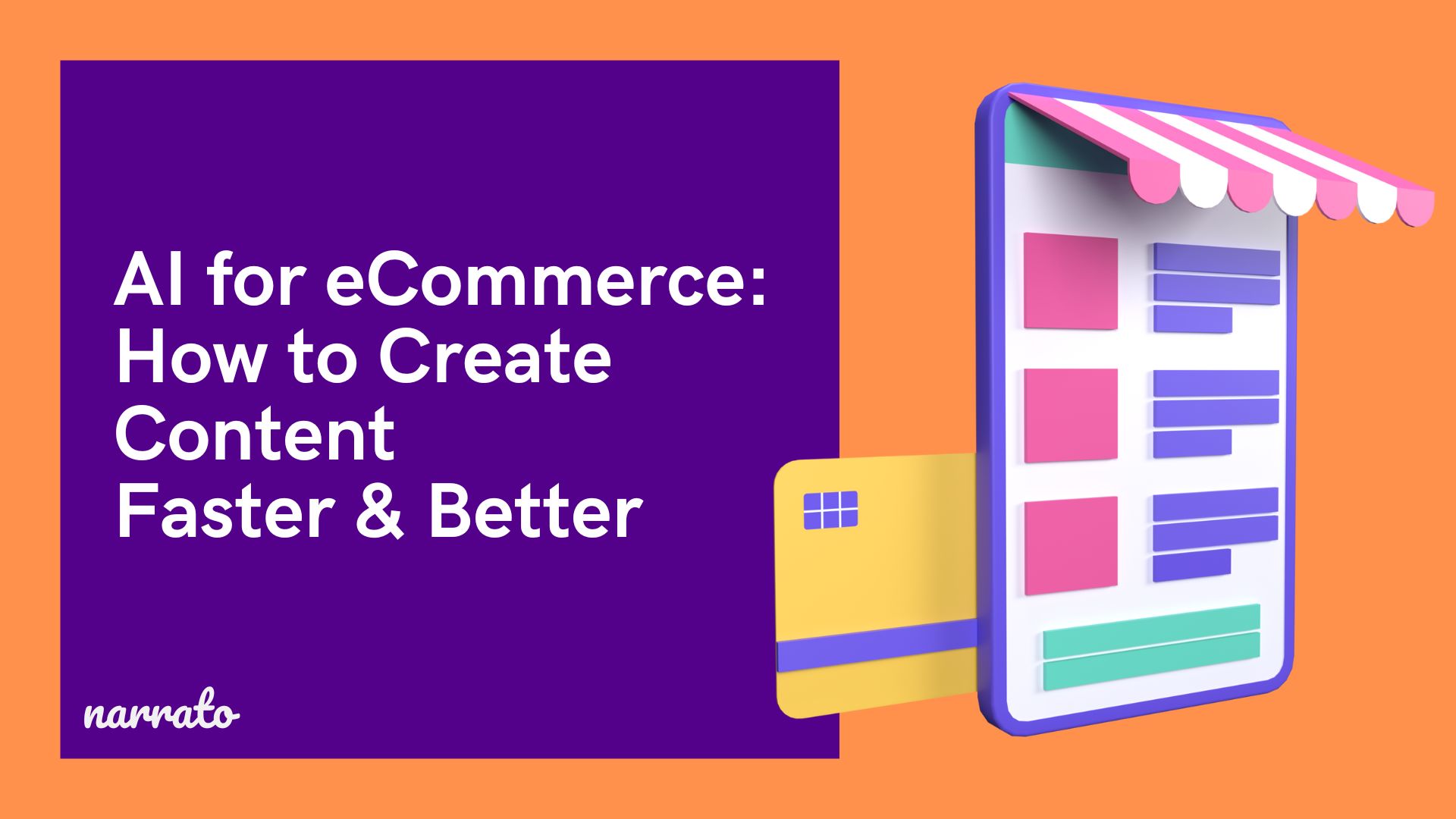In the fiercely competitive world of eCommerce marketing, effective content creation holds immense importance. Compelling product descriptions and engaging content can make or break a customer’s decision to make a purchase. That’s why eCommerce businesses are constantly seeking innovative ways to streamline their content creation process while maintaining a high level of quality. This is where AI tools can be a game-changer in revolutionizing content creation for eCommerce. Creating content with AI for eCommerce can not only be faster but can also improve content quality, consistency, and overall productivity in the process.
In this blog post, we will delve into the significance of effective content creation in eCommerce marketing. We will explore how AI eCommerce content creation tools are reshaping the landscape, enabling businesses to create content that captivates and converts.
Why You Need AI for eCommerce Content Creation and Marketing
To stand out from the crowd of eCommerce businesses, you need to constantly produce high-quality content that engages and captivates your target audience. But content creation can be time-consuming and resource-intensive, especially when you’re trying to create quality content.
Using AI for eCommerce content creation and marketing you can address these challenges and make the process a lot simpler. Here are some benefits of using AI eCommerce content creation tools.
- AI boosts speed and efficiency by automating the content creation process
- AI can help create personalized and targeted content driven by data and knowledge of customer preferences
- AI can bring consistency to the quality of content created
- Tools like bulk product description generators can save you costs and resources by producing huge volumes of content in half the time.
Apart from this, using AI for eCommerce content creation also takes a major burden off your shoulders as a marketer, allowing you to focus more on building strategy and growing the business.
TL;DR here’s a video summary of the key takeaways.
Here are 11 ways using AI for eCommerce content creation can help –
- AI copywriting tool for eCommerce websites
- AI product description generator for eCommerce stores
- AI blog writer for eCommerce blogs
- AI SEO tool for eCommerce marketing
- AI content improver and paraphrasing tools for enhancing existing eCommerce content
- AI social media writer for eCommerce marketing on social
- AI ad copy generator for eCommerce marketing
- AI email writer for eCommerce email marketing
- AI image generator for eCommerce blogs and marketing material
- AI image modifier for eCommerce product listings
- AI video generator for eCommerce video marketing channels
Best practices for leveraging AI in eCommerce content creation

How to use AI for eCommerce content creation and marketing
When it comes to using AI for eCommerce content, there are so many ways that you can leverage this technology. From creating copy for your eCommerce site to writing product descriptions to generating blog posts to reach a wider audience, the possibilities are endless. In this section, we will walk you through some of these use cases of AI in eCommerce content creation and share some tips on how to get the best output from these AI tools.
1. AI copywriting tool for eCommerce websites
Your eCommerce website content is the very first thing a visitor or a prospective customer would notice, so it is important to get it right. If you are investing in a good AI writer for your eCommerce content, it is highly likely that it will have an AI copywriting tool that will be extremely useful here. An AI copywriting tool can help you generate copy for your website’s home page, product landing pages, ads, and much more.
Here’s how you can use Narrato’s AI copywriting tool to create eCommerce content, for instance. Narrato AI offers several use cases for AI copywriting and you can choose one of the many AI templates based on what you’re looking to create. Let’s say you need landing page copy for a product on your eCommerce website. You can search for the “Webpage copy/landing page” template on the AI Content Assistant to get started. Once you’ve opened the AI template, you’ll see dedicated fields for entering the product name, product description, features, benefits, target customers, and keywords. You can also define the ideal length of the copy you want to generate. Just input all the details and the copy will be generated within seconds.
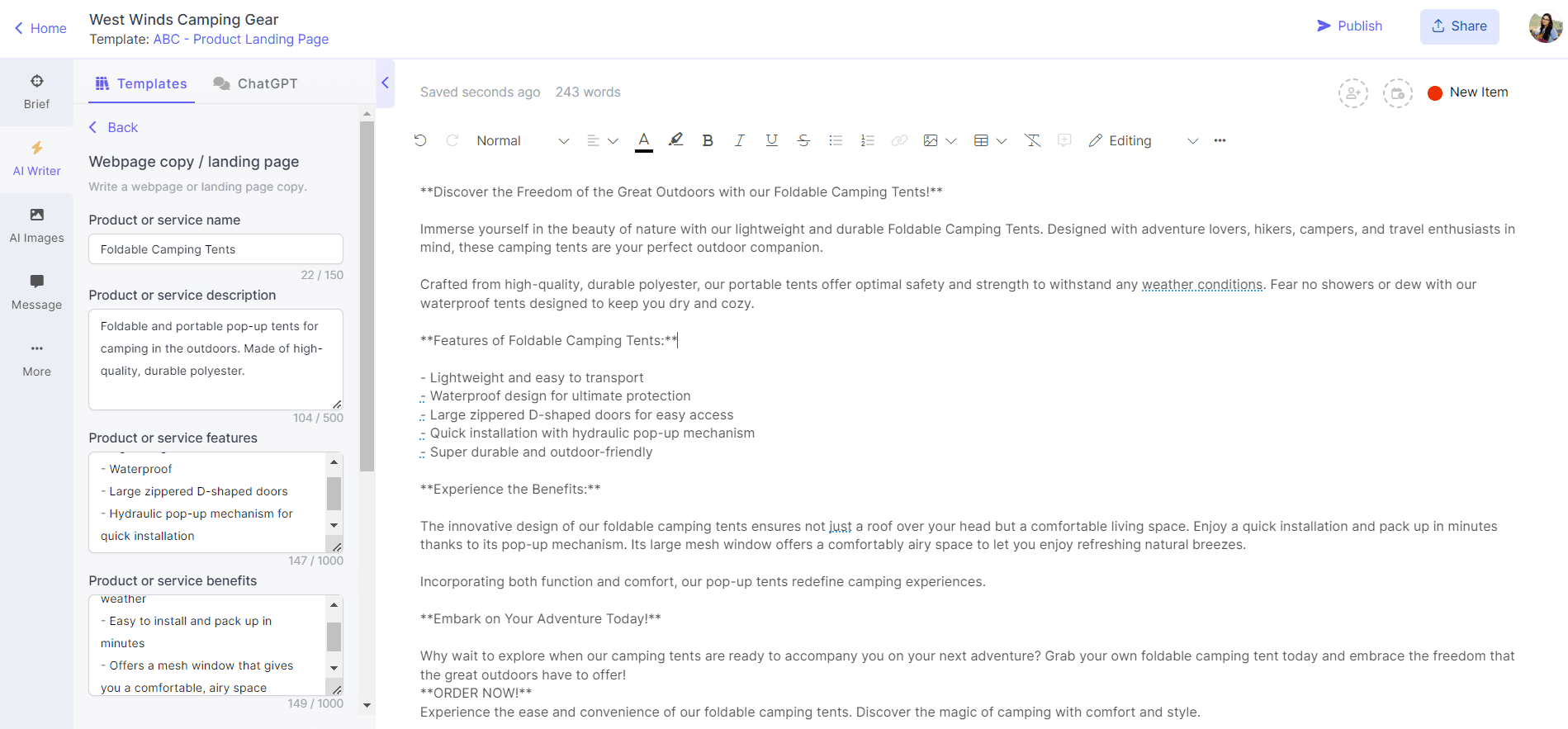
The entire copy in the image above is generated by Narrato’s AI copywriting tool. As you can see, the copy is actually ready to publish right away. It also structures the content in a way that most eCommerce platforms like Amazon or Shopify require. However, make sure that you always review AI-generated content before hitting publish, to ensure correctness and accuracy.
We’ve only demonstrated the web page copy use case here, but you can also generate headlines for your web pages, generate copy as per AIDA, BAB or PAS frameworks, use the AI business name generator for product and business name ideas, and do a lot more.
2. AI product description generator for eCommerce stores
Another major time sink in eCommerce content creation is generating product descriptions. Especially if you have a steady supply chain and efficient inventory management, it is likely that there is a substantial product inventory. This is great for your business, but it also means that you need to list all those products on your eCommerce store and each different item needs a compelling product description. Creating these hundreds of product descriptions can be a pain. Moreso, if your eCommerce business sells on multiple platforms.
You have to make sure that your product descriptions are unique, keyword optimized, appealing to the customer, and accurate so as to highlight the true value of the product. This is where a bulk AI product description generator can be of great help. Narrato’s AI product description generator, for instance, lets you generate up to 100 descriptions in one go. Or if you have fewer products and would like to take it a little slower, you can always generate single product descriptions as well.
This gives you a lot of flexibility in terms of how you manage your product listings and can save you hours of work.
Here’s an example from the single AI product description generator on Narrato.
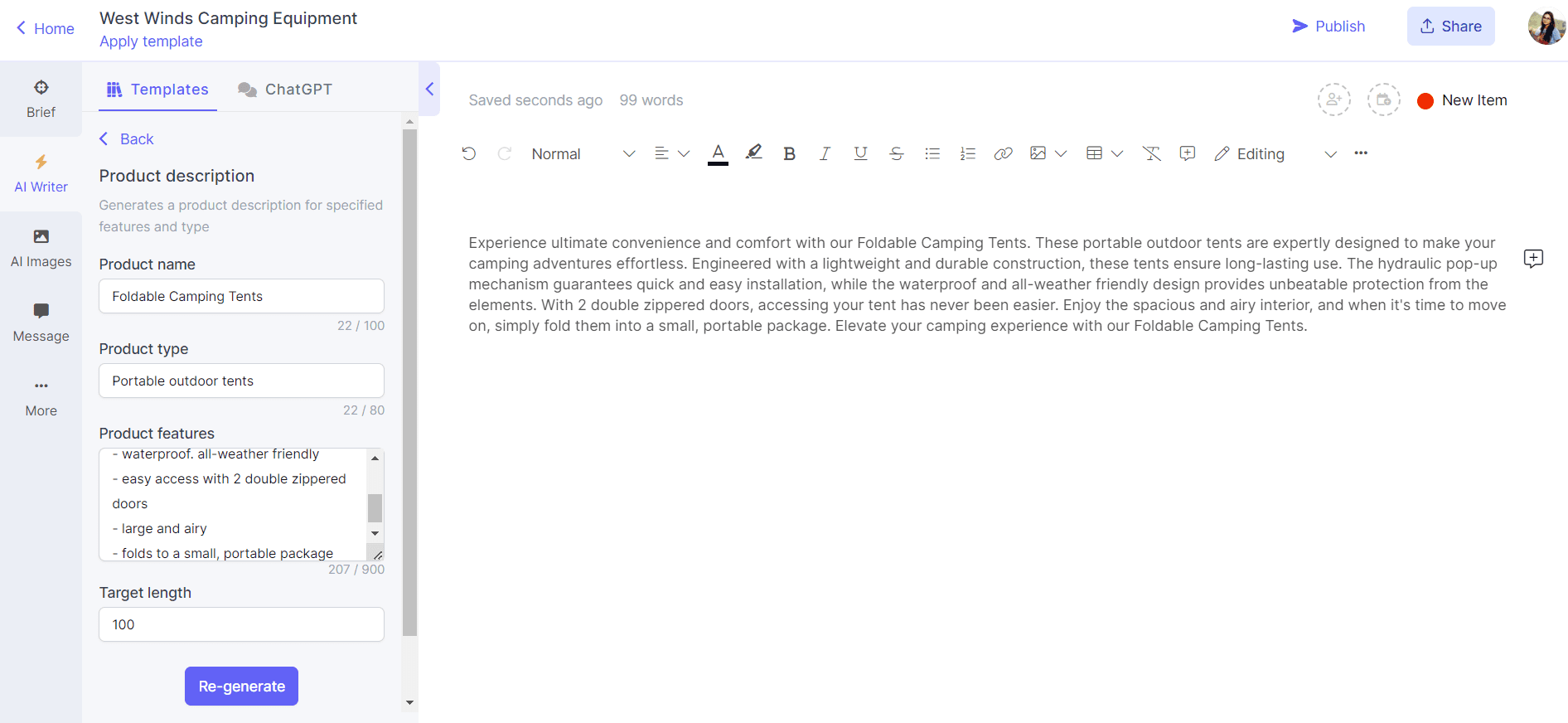
You only have to provide your product name, type, and features to generate a comprehensive and well-rounded product description in seconds. To generate product descriptions in bulk, you can easily upload a CSV with all the details and you will have the descriptions, ready to edit on Narrato or as a downloadable file.
When running an eCommerce business product descriptions will be the bulk of the content you produce and will be constantly required. So adding an Ai product description generator to your tool stack is essential.
3. AI blog writer for eCommerce blogs
Your website, product descriptions, and ads are important for making sales, but your eCommerce site also needs more visibility and new customers. A good blog can bring in organic traffic which is very beneficial. Through blog posts, you can provide valuable information about your industry, products, and market to potential customers. If your blogs rank in search engines, more people can find this information and your audience will grow. Offering useful information to potential customers can help build trust in your business. Assisting them in making good purchase decisions can also drive them to your eCommerce site.
But blog content is usually long-form, which means it is also time-consuming. To keep your blog running, you will need AI-powered marketing automation tools. You can create content 2x faster with an AI blog writer, leaving you enough time to invest in other critical work for your business. Even if you have a team of writers, an AI blog writer will help boost their productivity and speed.
An AI blog writer can help you in several ways. If the AI software has an AI content ideas generator, you can generate blog topic ideas. You can also generate blog post outlines, introductions, sectional content, conclusions, and more. You can even generate entire blog articles from just a topic or an outline. However, as with all AI-generated content, make sure that you review these AI-generated articles closely before publishing.
Again, taking an example from Narrato’s AI blog writing tool, let’s see what it gives us. We tried the “blog article from topic” use case here.
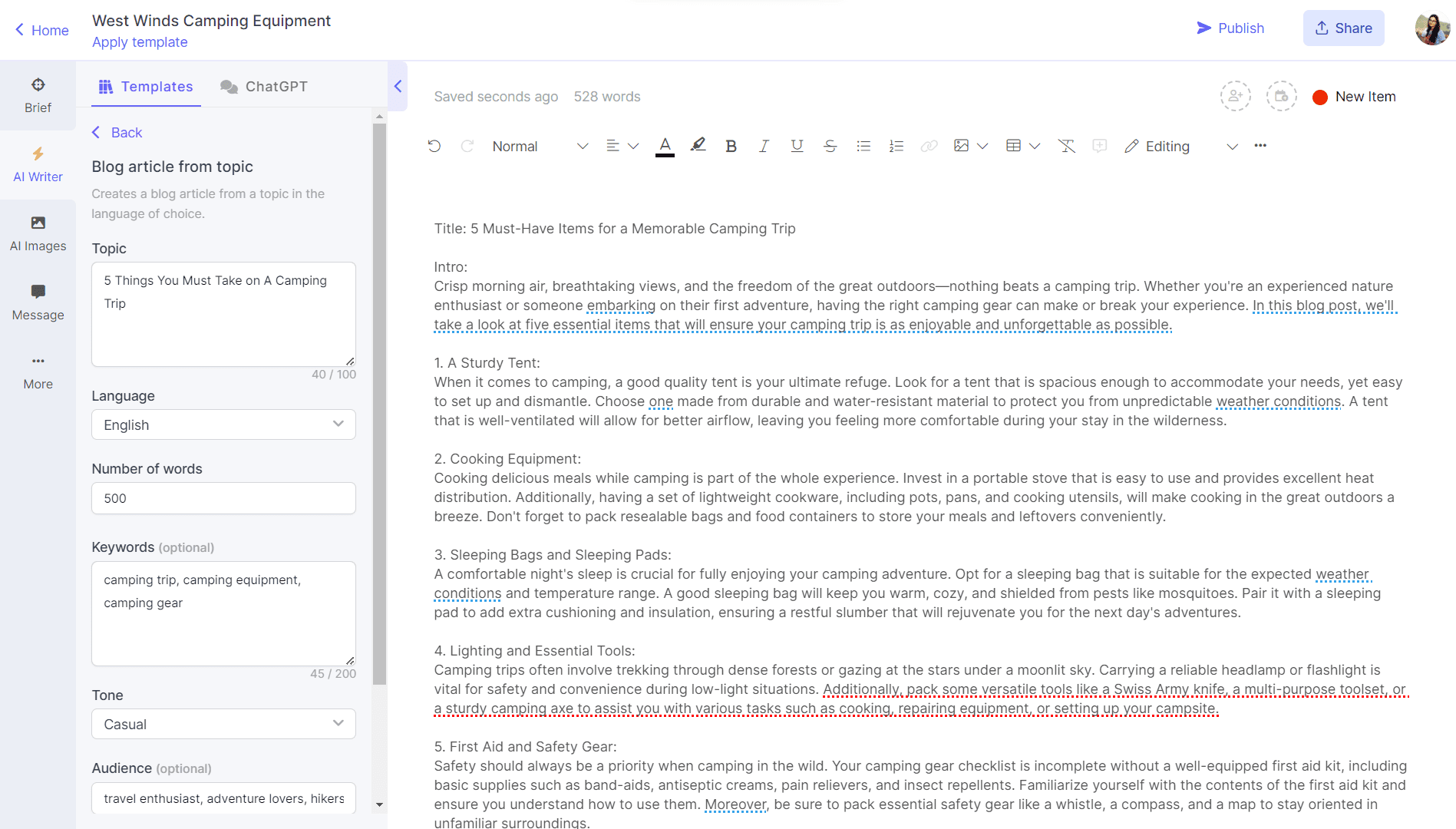
So we had an entire 500-word article generated by the AI writer, and the content is pretty comprehensive and useful. All we have to do is review, make minor edits where necessary, run the plagiarism check on Narrato, and publish. In fact, editing is also quite fast here as there are tools like sentence expander, text simplified, etc. that you can use wherever you need to make changes or add content.
4. AI SEO tool for eCommerce marketing
Talking about increasing visibility and ranking in search with your content, we cannot ignore the importance of SEO in content marketing. Everything that you publish on your online shopping site or blog has to be optimized for search if you want more people to find you. SEO involves finding the right keywords, ensuring that these keywords are used in the right frequency in your content, finding the right questions to answer, benchmarking against competitors, ensuring optimum length of content, and more. AI-powered search engine optimization tools can make this process much faster.
Narrato’s SEO content brief generator, for example, gives you a complete SEO content brief based on a topic or search term. The brief includes top keywords with idea keyword counts, questions to include, references, ideal word count, and other parameters. This can be a good place to start optimizing your content. The SEO brief is attached to the content task on the editor so you can also see the keyword counts dynamically update as you start writing.
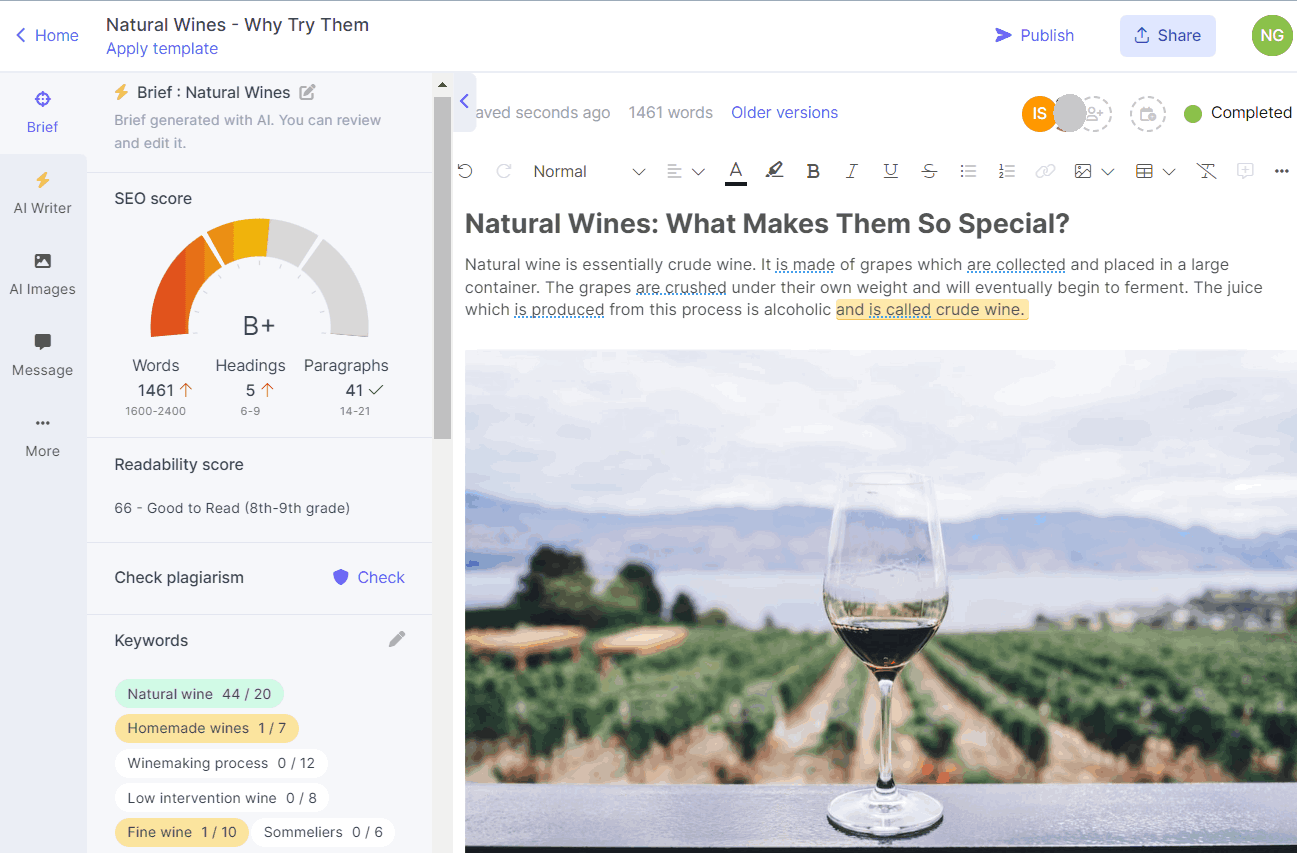
The tool will give you an SEO score as well, which tells you how well-optimized your content is as per the suggestions on the brief.
Apart from this, you can also use an AI keyword generator to help you kickstart your keyword research for the website or blog. An AI keyword generator can give you a list of keywords with average search volumes based on the product, service or theme that you provide as input. This is not everything you need, but it can serve as good initial research. You can further use tools like Google Keyword Planner to find related keywords to the ones suggested by the AI tool. It is also important to verify the search volumes the AI tool provides to ensure maximum accuracy.
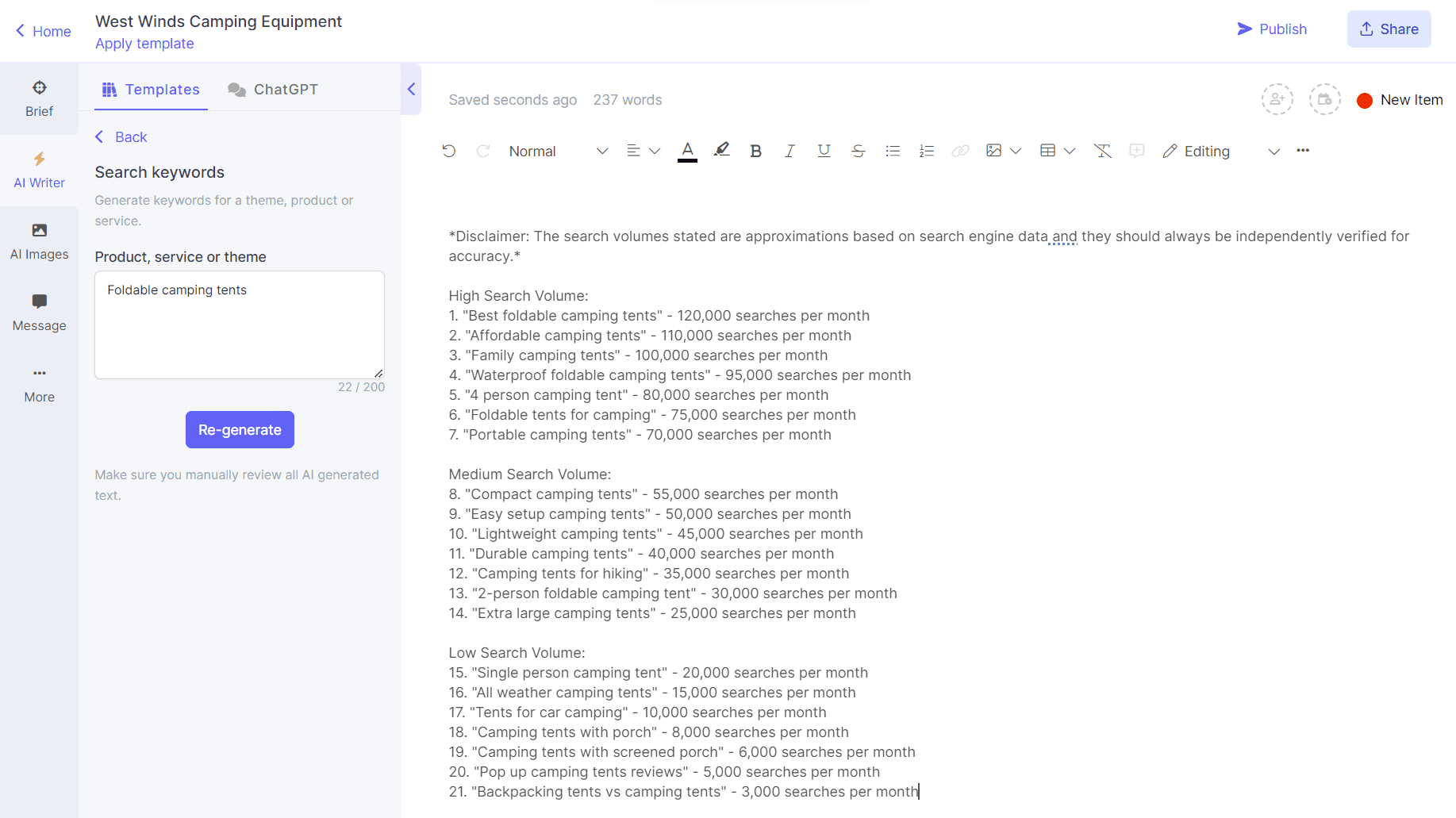
5. AI content improver and paraphrasing tools for enhancing existing eCommerce content
It might so happen that you have already been publishing content and you would probably like to redo some of it. But in the daily grind of creating new content and running a business, just the thought of overhauling old content can be scary. Thankfully, using AI in eCommerce content marketing can help with this too. Most of the good AI-powered marketing automation and content creation tools have some use cases that could be extremely useful here.
Let’s take AI paraphrasing tools for instance. These natural language processing tools help rewrite content to make it flow better or to make it simpler to read for your audience. Then there are AI content improvers that can help you rewrite content to better align with your brand’s tone of voice.
For instance, here we took a simple paragraph from a blog post and asked the tool to rewrite it in a funny tone, and here’s what it gave us.
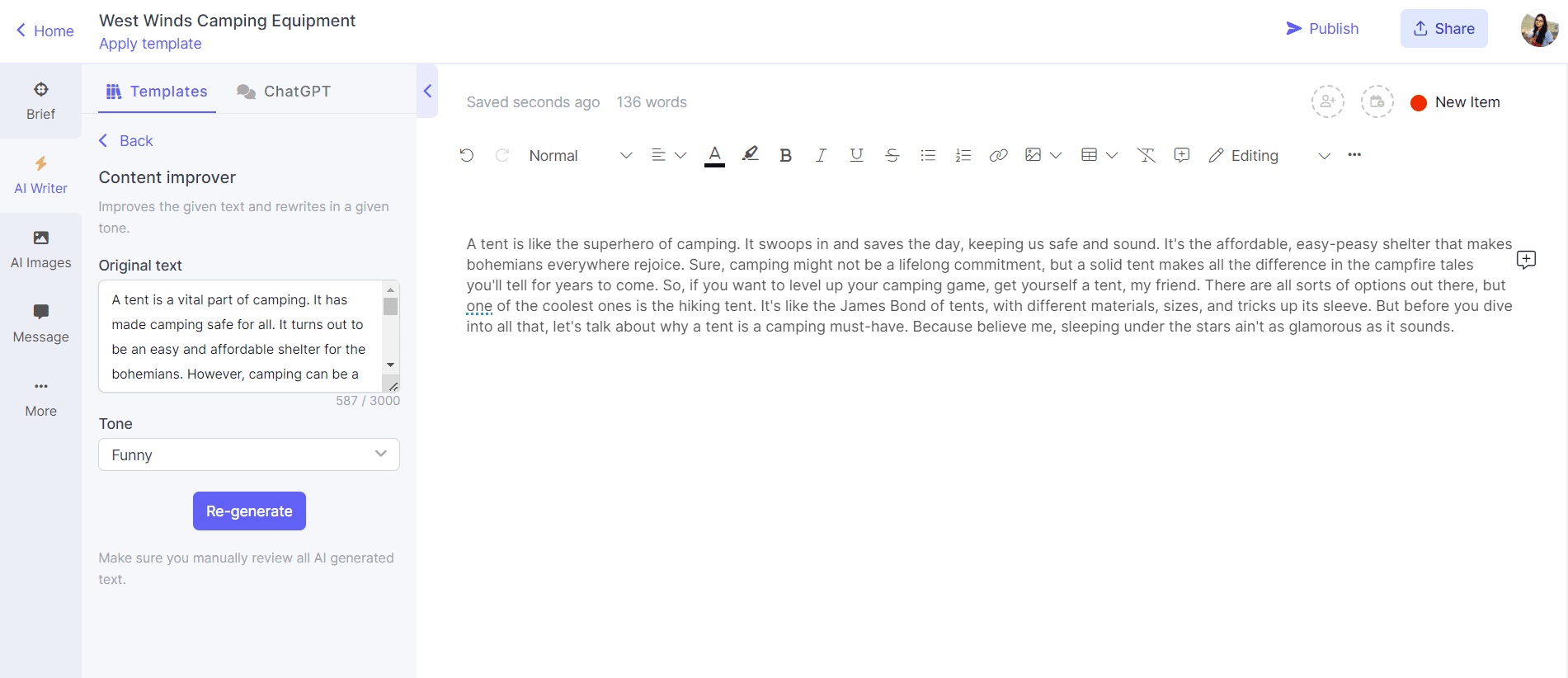
Tools like AI content improvers and paraphrasers can save you crucial time, making updating old content the least of your worries.

6. AI social media writer for eCommerce marketing on social
If you are running an online business, you have to be on social media. Not only do you need a strong social media presence, but you also need to post content consistently and ensure it’s engaging enough to capture attention, spark conversations, and drive social selling. So your social media marketing strategy must be on point, and that again involves a lot of content creation.
AI social media post generators can be a huge support in this process. They can help you repurpose content for social, create new social media posts based on your notes, generate posts for various social platforms with the right hashtags, and do so much more.
So whether you looking to put out an informational post, a holiday post, a meme, a promotional post, a Twitter thread, or something else, an AI social media posts writer can probably help you with it all.
Let’s take a look at an example of a holiday post generated using the AI writing assistant on Narrato.
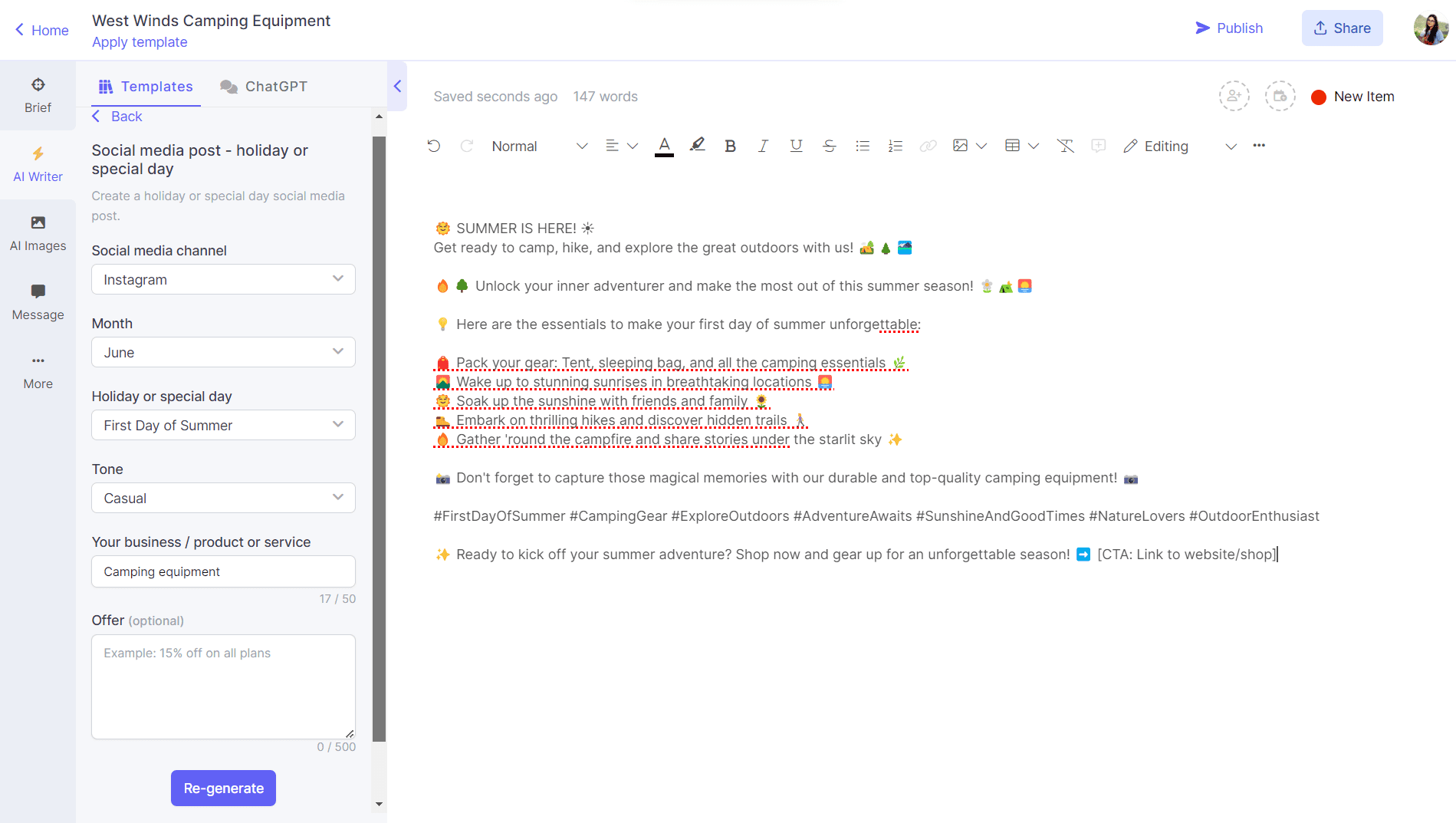
You can also generate social media posts with quotes, URLs, polls, and so much more.
7. AI ad copy generator for eCommerce marketing
As an eCommerce marketer, you will certainly want to invest in ads. These could be Google ads, Facebook ads, LinkedIn ads, or on any other platform. Ads help you stand out in a sea of online businesses and help you reach a relevant and targeted audience who would be interested in your products. But when it comes to creating ad copy, it can get quite challenging.
Though not necessarily time-consuming, creating ad copy does require immense copywriting skills. You have to convey your message and your product’s value in very few words, which isn’t easy. This means you either have to be a very good copywriter yourself or have to hire someone who can do justice to your ad copy. Or you can simply invest in a good AI ad copy generator!
An AI ad copy generator can write your ads based on just your product name and a few details about the product. Here’s an example of a Google ad generated on Narrato.
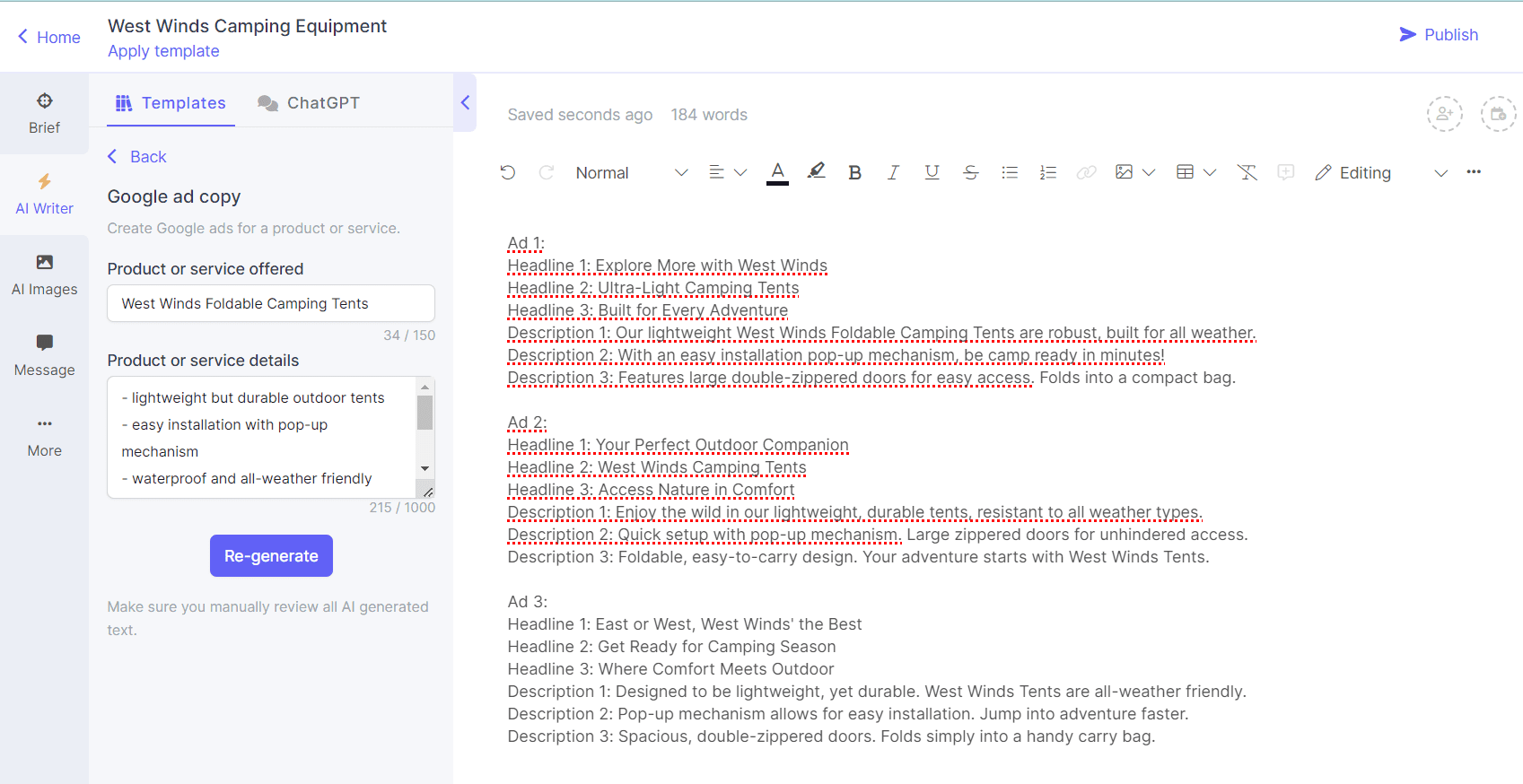
As you can see, the AI tool offers three different ad copy options and each of these also offer three versions of headlines and descriptions for you to choose from. Picking your favorites from these multiple options, you can put together a very catchy and impactful ad for your Google campaign.
It also has separate templates for LinekdIn ads, Facebook and Instagram ads, and classifieds.
8. AI email writer for eCommerce email marketing
Email marketing is certainly one of the most crucial parts of eCommerce marketing. Emails are also one of the best channels for customer interactions. From cold target emails to prospects to product recommendations to sending offers and discounts, emails are an eCommerce marketer’s best friend as they land you directly in buyers’ inboxes. But it doesn’t take long for these emails to be moved to spam if they aren’t written well. Online shoppers receiving your email have to be intrigued by the subject line, urged to open your email, and take action. While it might be fun crafting these emails yourself, you can save a lot of time by automating the email writing process.
An AI email writer can help you write phenomenal subject lines, promotional email copy, or even improve the email you just wrote.
Here’s an example of how an AI-generated email could look.
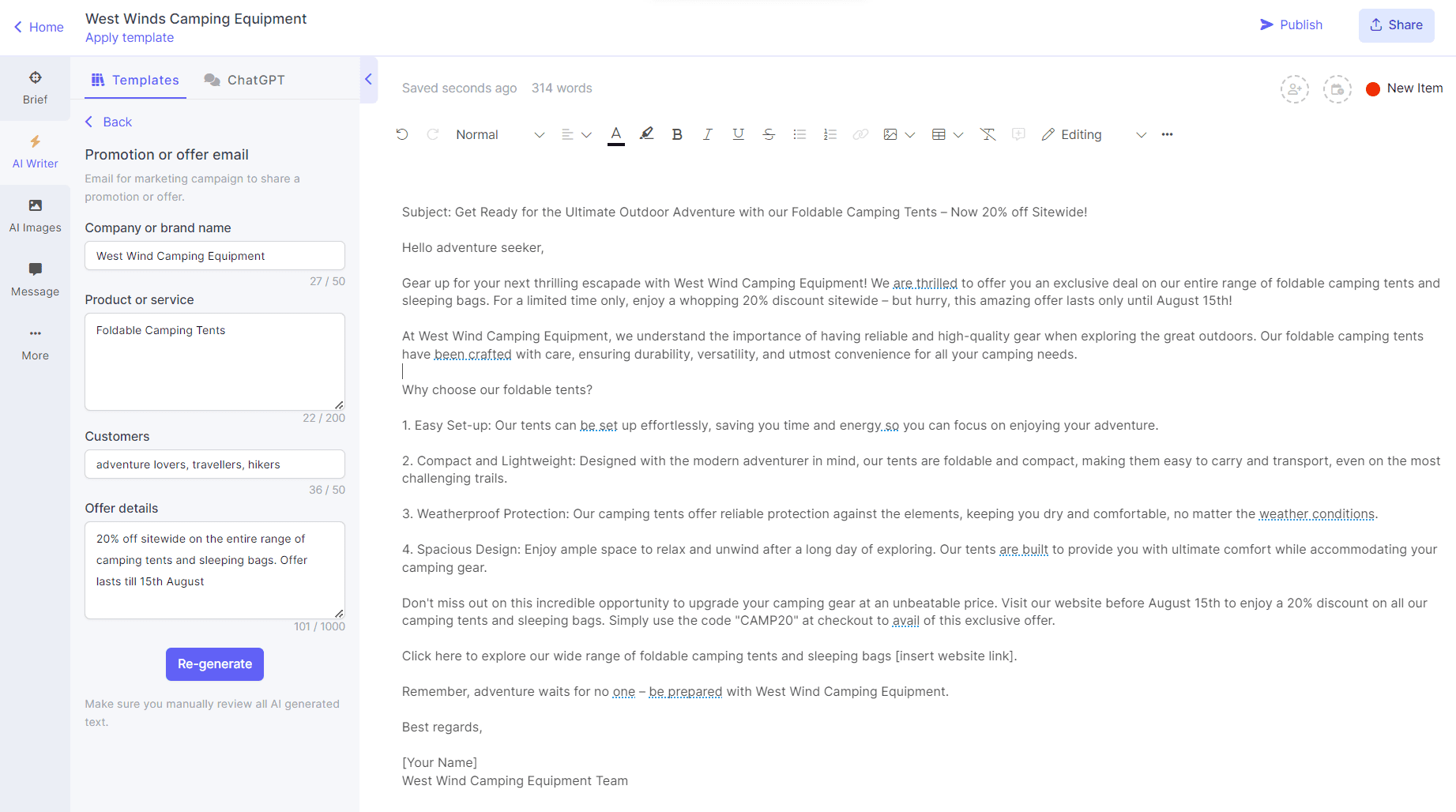
We think it is a great first draft and covers almost everything we would want to say. We could actually send this out with very few edits.
You can also try generating different subject lines for your email, generating emails from an outline, or personalized cold outreach emails as well.
9. AI image generator for eCommerce blogs and marketing material
While you would use your original product images for your website or product listings, you could still need stock images for other marketing materials like your blog. And what’s better than using stock photos here? Creating custom images! This is where an AI image generator could come in handy for eCommerce marketers too.
AI text-to-image generators can convert simple text prompts and ideas into stunning custom images. The more detailed your input the better the output of the AI tool will be. You can also generate images in various styles like photographs, oil paintings, cartoons, and others.
Here’s one from Narrato’s AI Images tool

When you can’t find the perfect image to truly represent your idea, AI images can turn your creativity and imagination into a real visual.
10. AI image modifier for eCommerce product listings
Another important visual content creation tool that eCommerce businesses can benefit from is AI image modifiers. These AI tools let you modify and edit simple images to create customized and unique product images for your site. They let you add elements, remove or replace backgrounds and do much more to make your product images stand out.
Typeface is a popular AI image modifier that you could use for this. Typeface can help you turn a humble product photo into a beautiful product image that looks professionally shot, without having to spend a fortune.

11. AI video generator for eCommerce video marketing channels
When building your online presence today, it is also important to focus on channels like audio and video. Everyone is on YouTube and buyers turn to these platforms for research. This makes creating videos as part of your marketing plan even more important. But video production can be an expensive affair for small businesses.
This is where an AI video generator can help. Yes, there are AI eCommerce content tools that can help you generate studio-quality videos from just a script. You can create a video script within seconds using Narrato’s AI video script generator and create a video based on the script using any of the AI visual content generation tools like Canva, Syntehsia, Predis.ai, or InVideo. Some tools like Synthesia and InVideo can directly convert your script to videos.
You could create product videos, tutorial videos, video reviews, video guides, and other content that your audience would find useful in their buying journey.
Best practices for leveraging AI in eCommerce content creation
Although AI for eCommerce creation is undoubtedly a blessing, it is still upon you to ensure that the content you put out is factually correct, useful, and unique. This is important not just for brand building but also for ranking in search engines and avoiding penalties.
Some best practices you must keep in mind when using AI for eCommerce content marketing are –
Balancing AI-generated content with human input and creativity – AI eCommerce tools for content creation are not here to replace human creativity but to augment it. So make sure that you balance the use of AI and human content creators’ inputs. Always review and edit content to make it flow better, avoid errors and deliver maximum value to the end user.
Optimizing content for search engine rankings and user experience – Even when using AI-generated content, make sure that it is optimized both for search engines and for user experience. For SEO, keyword optimization, addressing the right questions, etc. will help. For user experience, ensure the content is easily readable. Break down long paragraphs and sentences, simplify complex text, and make things easier to comprehend wherever necessary.
Regularly updating and refreshing product descriptions and copy – Lastly, remember that content marketing does not succeed with a fit-it-and-forget-it kind of approach. It needs to be continuously monitored for performance, revisited and updated to deliver more value, and continuously improved. So make sure you refresh your AI-generated content from time to time to keep it relevant and competitive.
Wrapping up
Effective content creation is undeniably crucial in eCommerce marketing, as it directly impacts a customer’s purchasing decision. However, the traditional manual approach to content creation can be time-consuming, prone to errors, and lacks scalability. AI eCommerce content creation tools come to the rescue here. With their ability to generate content efficiently, accurately, and at scale, AI technology is revolutionizing content creation. By using AI for eCommerce content, you can not only create content better and faster but also maintain consistency, personalize product descriptions and emails, and save valuable time and resources.
So, if you’re an eCommerce business looking to stay ahead of the game, it’s time to embrace AI technology and unlock the power of better and faster content creation. Embracing AI may just be the key to outshining competitors and maximizing success in the ever-evolving world of eCommerce marketing.


